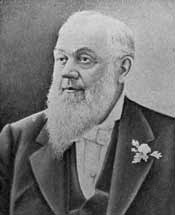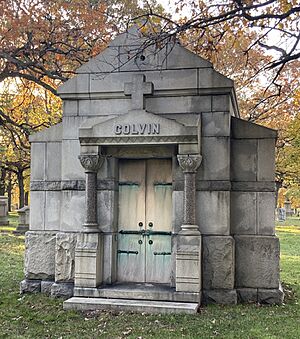Harvey Doolittle Colvin facts for kids
Quick facts for kids
Harvey Doolittle Colvin
|
|
|---|---|
 |
|
| 27th Mayor of Chicago | |
| In office December 1, 1873 – July 24, 1876 |
|
| Preceded by | Joseph Medill, (Lester L. Bond) |
| Succeeded by | (Thomas Hoyne), Monroe Heath |
| Personal details | |
| Born | December 18, 1815 Herkimer County, New York, US |
| Died | April 16, 1892 (aged 76) Jacksonville, Florida, US |
| Resting place | Rosehill Cemetery |
| Political party | People's Party |
| Residences | Chicago, Illinois |
| Signature | |
Harvey Doolittle Colvin (born December 18, 1815 – died April 16, 1892) was an American politician. He is best known for serving as the mayor of Chicago, Illinois. He was mayor from 1873 to 1875. Colvin was a member of the People's Party. This group was a part of the Republican Party in Chicago. They generally supported allowing alcohol sales.
Contents
Harvey Doolittle Colvin: Chicago's Mayor
Early Life and Beginnings
Harvey Doolittle Colvin was born on December 18, 1815. His birthplace was Herkimer County, in New York.
Becoming Mayor of Chicago
Before becoming mayor, Colvin worked as Chicago's city treasurer. In the 1873 Chicago mayoral election, he ran for mayor. He won the election against the acting mayor, Lester L. Bond. Colvin officially became mayor on December 1, 1873.
Soon after he took office, a large group of people came to City Hall. More than 12,000 workers who did not have jobs marched to ask for help. They wanted jobs and support. The crowd left after city leaders promised to help them. An alderman even offered to buy them food if the city would pay him back later.
Challenges During His Time as Mayor
As mayor, Colvin's administration made some big changes. They removed a rule that banned alcohol sales on Sundays. The previous mayor, Joseph Medill, and Lester L. Bond had supported this ban.
In 1874, there were some problems during Colvin's time as mayor. There were claims of favoritism in city jobs. There was also a problem in the city treasurer's office.
Colvin was mayor when the Chicago Fire of 1874 happened. This fire took place on July 14, 1874. His team had to manage the city's response to the fire. They also had to deal with fire insurance companies. These companies were upset and blamed the city for not being careful enough about fire prevention.
Leaving the Mayor's Office
In 1875, the city council decided to hold new elections. This was because of a new law called the Cities and Villages Act of 1872. However, they did not include the mayor's job in the list of offices for election.
Despite this, Thomas Hoyne ran for mayor in the April 1876 election and was elected. But Colvin did not want to leave his position. He stayed on as mayor, even after Hoyne was sworn in. The city comptroller supported Colvin in this decision.
In 1876, a state judge ordered a special election for mayor. Monroe Heath, who was a Republican, won this election. He beat two other candidates: James J. McGrath from the Democratic Party, and Mark Kimball from Colvin's People's Party. Monroe Heath became the new mayor on July 24, 1876.
Later Life and Legacy
Harvey Doolittle Colvin passed away on April 16, 1892. He died in Jacksonville, Florida. His body was buried in Rosehill Cemetery in Chicago.
 | Emma Amos |
 | Edward Mitchell Bannister |
 | Larry D. Alexander |
 | Ernie Barnes |


